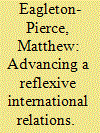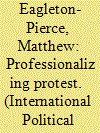| Srl | Item |
| 1 |
ID:
105935


|
|
|
|
|
| Publication |
2011.
|
| Summary/Abstract |
This article advances a call for greater reflexivity in International Relations (IR) to uncover various intellectual and political biases that may obscure the research process. Inspired by existing reflexive practices in IR and, in particular, Pierre Bourdieu's use of such a method, it argues that reflexivity matters for enhancing ethically grounded research, in terms of not only the choice of subjects to study, but also how specific problems are treated, and hence what kind of results can be expected. However, the argument also goes beyond the appeal to autobiographical reflexivity to embrace other dimensions. This includes attention to institutional forces that shape the agency of the scholar and, in turn, the complex relationship between the academy and the wider political world. In the most ambitious sense, the potential for reflexivity can also be conceived collectively in terms of activist intellectuals who seek to reward reflexive practices through dialogue and political intervention. The social space of international trade politics is taken as an empirical example.
|
|
|
|
|
|
|
|
|
|
|
|
|
|
|
|
| 2 |
ID:
161362


|
|
|
|
|
| Summary/Abstract |
A range of socio-economic dislocations have spawned renewed interest in the capitalist system and its critiques. Within these trends, the politics of international trade has often been a flashpoint for civil society organisations (CSOs) concerned with social justice. This paper uncovers a neglected feature of this landscape: how, since the 1980s, certain CSOs have shifted from being ‘radical outsiders’ to ‘reformist insiders’ to protest the design and purpose of global trade. We know why CSOs have criticised the political economy of trade, but less about how they have historically struggled to gain admission into this policy milieu; their internal strategising and tensions; and what makes for effective protest. To understand such experimentation, this paper argues that literature on professionalisation offers a valuable lens for exploring the relationship between expertise and power. Dovetailing with other research in IPS, it adapts Bourdieu's comparatively underused concept of scientific capital to explicate how certain, prized dispositional qualities were acquired and practiced for the purpose of registering policy impact. This argument is developed through the case of Oxfam. When viewed historically, the paper suggests that a professionalised, activist subjectivity has emerged within certain CSOs, defined here under a new ideal-type notion of the ‘critical technician’.
|
|
|
|
|
|
|
|
|
|
|
|
|
|
|
|